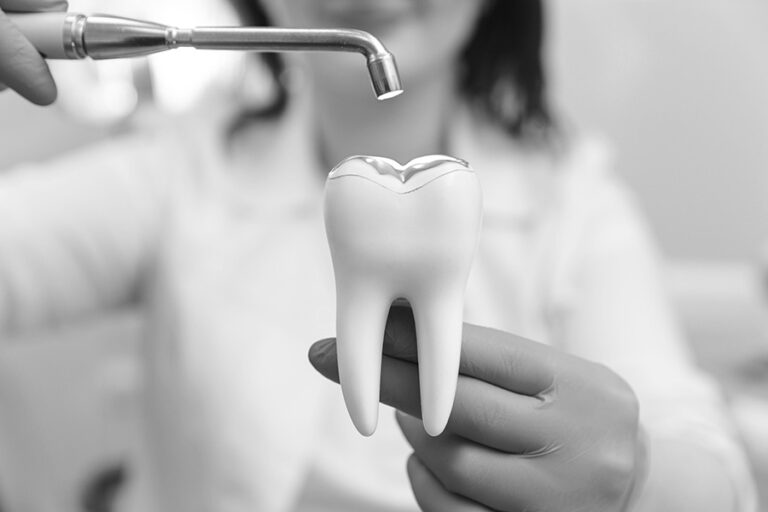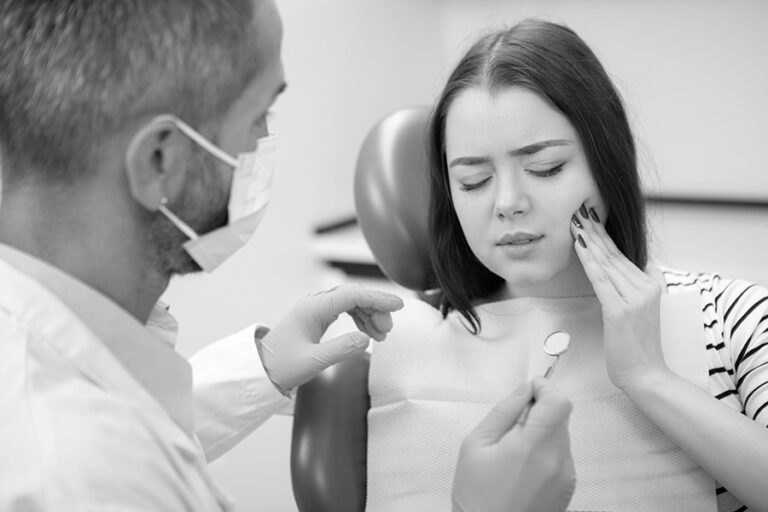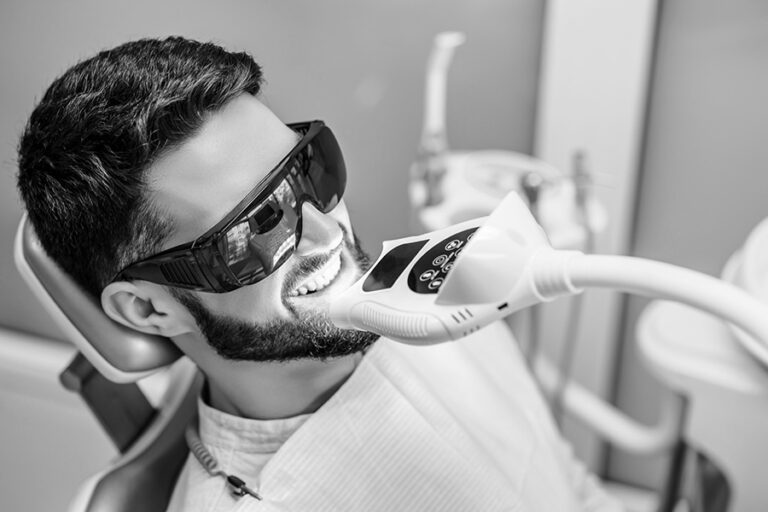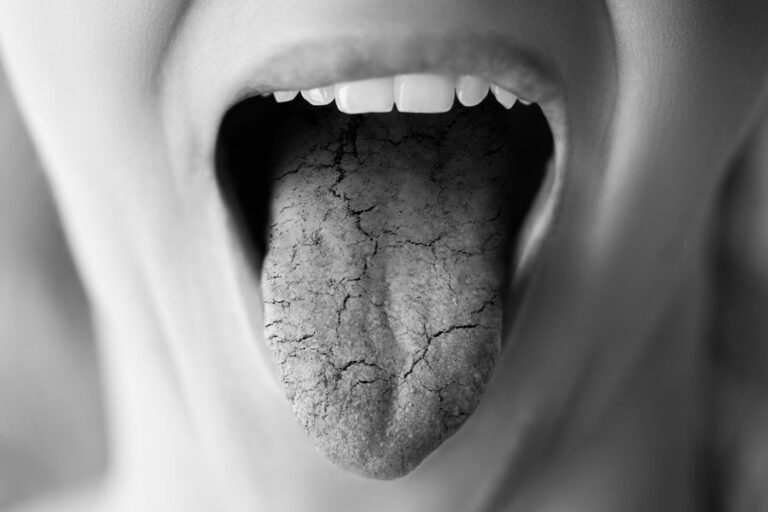Uncategorized
What Are Modern Tooth Fillings Made Of?
In the past, getting a dental filling usually meant a gleam of metal in your mouth. Advancements in modern dentistry now offer high-tech filling materials that blend long-lasting strength with seamless results. Today, metal-free, tooth-colored fillings have become the norm in many dental offices.
Tooth-Colored Fillings – An Overview
Tooth-colored dental fillings are made of a composite resin material that we closely match to the shade of your natural tooth enamel. When in place, the non-toxic material bonds to the natural tooth structure, strengthening and fortifying the affected tooth.
Tooth-colored fillings are constantly improved and reinvented. The earlier versions were best suited to repair small to mid-sized cavities on teeth exposed to moderate chewing pressure. However, today’s modern white fillings are suitable for any tooth, providing strength, durability, and virtually unnoticeable results.
Tooth-Colored Fillings vs. Amalgam Fillings
Composite resin fillings offer many advantages over their silver amalgam counterparts, including the following:
- Unlike silver fillings with their metallic color, white fillings match the color and shade of your natural teeth, providing a cosmetic tooth restoration solution.
- Tooth-colored fillings are more conservative because they require the removal of minimal tooth structure compared to amalgam fillings.
- Unlike white fillings, silver fillings contract and expand with temperature changes, often causing damage to the natural tooth structure.
- Composite fillings are metal-free, lowering the risk of metal allergies.
- Even though the mercury content in amalgam fillings is deemed safe by the American Dental Association, some patients prefer mercury-free fillings.
- Tooth-colored fillings are versatile restorations that can repair many tooth flaws, such as chips, wear, or discoloration.
What Is the Tooth-Colored Filling Procedure?
After numbing the area using a local anesthetic, we will remove the decayed tooth structure and clean and sterilize the area. Next, we’ll place the composite filling material in layers and hard it using a special curing light. The last step is shaping and polishing the filling material until it matches the shape and sheen of a natural tooth. Once in place, tooth-colored fillings blend in seamlessly with the surrounding teeth. With proper dental care, your restorations will enhance your oral health for many years to come.
Maintaining Healthy Smiles
The best way to treat cavities is to prevent them altogether. We encourage our valued patients to maintain good dental hygiene practices, including regular brushing and flossing. Steer away from hard foods to avoid chipping your natural teeth or restorations. It’s also important to schedule your routine dental exams and cleanings to allow us to monitor your oral health and your dental work.
Tooth-Colored Fillings Near Me
Contact Hebron Family Dentistry in Hebron, KY, to learn more about repairing cavities with tooth-colored fillings. Dr. Watson and her team are committed to enhancing your oral health and the appearance of your smile using the latest technology, techniques, and materials. Call us and schedule your appointment today!
What Qualifies as a Dental Emergency
Dental emergencies tend to happen at the most inconvenient times, and Hebron Family Dentistry is here to help. We’re fully equipped and prepared to provide quality dental emergency services to patients in Hebron, KY, and the surrounding communities. Here’s a look at what constitutes a dental emergency and what you can do to lower the chances of complications.
What Qualifies as a Dental Emergency?
A dental emergency is a situation requiring urgent care to alleviate severe pain, save a knocked-out or damaged tooth, control infection, or stop bleeding. While inconvenient, some dental issues, such as a lost filling, chipped tooth, or broken dental appliance, don’t constitute a dental emergency and can wait until the next day.
To determine whether you or a loved one are experiencing a dental emergency, ask yourself the following questions:
- Is there severe, persistent tooth pain?
- Are there signs of infection, including swelling of the mouth, jaw, or face?
- Has the mouth or face sustained a blow?
- Are there any knocked out, dislodged, or loose teeth?
- Is there bleeding from the mouth?
If you experience any of these symptoms, you’ll likely require urgent dental care. Please call our office immediately to get your smile back on track. If you’re not quite sure whether you’re experiencing a dental emergency, call our office for guidance. We will evaluate the situation and recommend the best course of action. If, however, you or a loved one experience a life-threatening emergency, please call 911 for assistance.
Common Dental Emergencies and What You Can Do to Help
If you experience a dental emergency, timely treatment can make the difference between saving or losing a tooth. Make sure to contact us right away.
Severe Tooth Pain: Pain may indicate a serious infection requiring emergency care. Rinse with warm water and floss to dislodge any trapped food or debris, and take over-the-counter pain medication for relief. Do not place aspirin on your gums to avoid tissue damage. Call us for an emergency appointment.
Knocked-Out Tooth: Pick up the tooth from its crown and rinse it gently. Try returning it to its socket, and if that’s not possible, place it in some milk. The quicker you seek emergency care, the higher the chances of saving the tooth.
Other Dental Emergencies: A cracked, broken, dislodged, or loose tooth can be very painful and require urgent dental treatment. Rinse your mouth with warm water, and contact us for an emergency appointment.
Bleeding: Gentle pressure can help stop the bleeding. However, if you have heavy, uncontrollable bleeding, head to your nearest emergency room or call 911.
Emergency Dental Care Near Me in Hebron, KY
Our team at Hebron Family Dentistry hopes you never experience a dental emergency but are here for you in the event you do. We are committed to delivering quality urgent dental care you can trust. Please keep our number on hand and call us at 859-689-2021 if you experience a dental emergency.
Am I a Candidate for Implant-Supported Dentures?
Implant-supported dentures offer an outstanding alternative to traditional dentures with unmatched stability, durability, and aesthetics. If you’ve ever wondered if you are a candidate for this superior tooth replacement option, contact Hebron Family Dentistry to schedule a consultation. Dr. Watson will determine whether you’re a candidate for implant surgery and if not, she’ll work with you to get you there.
What Are Dental Implants?
Dental implants are titanium screw-like posts that we place in your jawbone to replace missing tooth roots. They provide a stable foundation to support one or multiple replacement teeth, with unmatched results. Implant dentistry offers a cosmetic and restorative solution, delivering replacement teeth that are the closest you’ll ever have to healthy, natural teeth.
What Are the Benefits of Implant-Supported Dentures?
Implant-supported dentures continue to grow in popularity due to the many benefits they offer, including the following:
- They help prevent bone loss, enhancing your oral health, and providing a comfortable fit that lasts.
- They restore the form, function, and aesthetics of missing teeth, delivering healthy, beautiful smiles.
- They allow you to chew and bite your food as efficiently as your natural teeth.
- They don’t shift or tilt, allowing you to maintain your standard speech patterns.
- They provide support for your facial muscles, reducing sagging and preserving your face’s natural shape.
- They are much more stable, comfortable, and functional than traditional dentures.
- With proper care, your implant-supported dentures can last a lifetime.
Are You a Good Candidate for Implant-Supported Dentures?
Candidates for implant dentistry need to have good overall health and healthy gums. If you have periodontal (gum) disease, you may still be a candidate for implant-supported dentures, as long as the condition is being treated and managed. However, you may need to delay the dental implant placement until the periodontal disease is under control.
To qualify for implant-supported dentures, you need adequate bone density to support the implants. If, however, you have bone loss, you may require a bone grafting procedure to build up the bone in the area, allowing you to enjoy the many benefits of implant-supported dentures.
Caring for Your Implant-Supported Dentures
You must maintain excellent oral hygiene practices to ensure the long-term success of your implant-supported dentures. Make sure you brush and floss regularly and visit Hebron Family Dentistry for your routine dental exams and cleanings. We will monitor your oral health and restorations to ensure you enjoy a healthy smile for life.
Implant-Supported Dentures Near Me
Contact Hebron Family Dentistry in Hebron, KY, to learn more about restoring your healthy, confident smile with the help of implant-supported dentures. Dr. Watson and her team look forward to enhancing your smile and quality of life. Call us and schedule your appointment today!
How Often Should I Have My Teeth Whitened?
If your smile is not as bright as you’d like, you may want to consider teeth whitening, one of the most popular cosmetic dentistry procedures today. The simple treatment will leave you with a lot to smile about. Your trusted team at Hebron Family Dentistry will evaluate your unique needs and recommend how often you should whiten your teeth for the best and safest results.
How Do Teeth Get Stained and Discolored?
As the years go by, your teeth may become dull and discolored due to many factors, including the natural aging process, consuming highly pigmented foods and beverages, tobacco use, and certain illnesses and medication. Chips or tooth injuries can also cause discoloration, especially if tooth pulp damage occurs.
Can Teeth Whitening Lift All Types of Stains?
Teeth whitening treatments are highly effective at lifting yellowish stains resulting from smoking or consuming foods and beverages such as berries, wine, or coffee. Brown or gray teeth, on the other hand, may not respond as well. Whitening will not work on dental restorations, such as crowns or fillings, or if the discoloration results from trauma or the use of medications. If you’re not a candidate for teeth whitening, we may recommend other cosmetic dentistry solutions, including dental crowns, porcelain veneers, or cosmetic bonding.
In-Office Teeth Whitening
Also known as chairside whitening, in-office bleaching involves the application of a hydrogen or carbamide peroxide gel to your tooth surfaces, then using a special light to speed up and intensify the whitening process. Professional teeth whitening at Hebron Family Dentistry can whiten and brighten your teeth several shades in just one office visit.
At-Home Teeth Whitening
Many whitening products are available for purchase over-the-counter, including peroxide-based gels and strips. There are also whitening toothpastes that contain mild abrasives that remove some surface stains.
While most do-it-yourself home whitening kits promise spectacular results, many are sure to disappoint. Worse yet, some can cause severe damage to your tooth enamel and your gums.
For safe and effective home whitening, we’re happy to provide you with custom-fitted trays and professional-grade whitening gel. It may take a little longer to achieve your desired results, but you’ll do so without damaging your teeth or gums.
How Often Should You Have Your Teeth Whitened?
Most patients require yearly in-office whitening treatments with touch-ups at home at intervals determined based on individual needs. Some people require touch-ups every few months, while others need more frequent whitening, including people who consume highly pigmented foods or those who smoke.
Teeth Whitening Near Me
Contact Hebron Family Dentistry in Hebron, KY, to learn more about whitening and brightening your smile. We look forward to having you in a sparkling, stain-free smile. Call us and schedule your appointment today!
Can a Root Canal Save My Tooth?
At Hebron Family Dentistry, we understand that many people dread the thought of root canal therapy. Dr. Watson and her team would like to reassure you that the treatment relieves tooth pain rather than causing it. The endodontic procedure is often the only viable treatment option to save a damaged tooth, restoring its health, appearance, and function.
What Is Root Canal Therapy?
Root canal therapy is an endodontic treatment that’s indicated if the dental pulp inside the root canals becomes infected due to severe tooth decay, tooth chips or fracture, or trauma. The treatment is also recommended to save a dead tooth, which is one that no longer has blood flow.
How Does Root Canal Therapy Save Damaged Teeth?
Unlike the rest of the body, damaged teeth can’t heal themselves. Without treatment, pulp infection and inflammation can lead to severe pain and may result in an abscess. As the condition progresses and deteriorates, it may result in the need for a tooth extraction, which may require a tooth replacement option, such as an implant or bridge, to maintain your oral health.
Root canal therapy is the only viable option to save a tooth with inflamed or infected pulp and nerves. The relatively comfortable procedure restores the affected tooth’s natural form and function. With proper care, a root canal-treated tooth can last a lifetime!
What Is the Root Canal Therapy Procedure?
Dr. Watson will start by numbing the area and administering dental sedation, if needed, for your comfort. The procedure involves making a small opening in the tooth’s crown to access and remove the affected pulp tissue. Dr. Watson will shape, sterilize, then seal the root canals with a rubbery material known as gutta-percha.
After a root canal procedure, a tooth is susceptible to breakage and will need a dental crown for protection. Dr. Watson will remove some of the tooth structure to accommodate the restoration. Next is taking impressions of your teeth to send to our dental laboratory for fabrication. A temporary crown will protect your prepared tooth as you wait. During an upcoming appointment, Dr. Watson will make any needed adjustments and cement the new crown in place. Your restored tooth will look, feel, and function like a natural tooth.
Root Canal Therapy Near Me
Contact Hebron Family Dentistry in Hebron, KY, to learn more about saving a damaged tooth with the help of a root canal treatment. Our gentle approach and sedation dentistry options will ensure that you are comfortable and free of stress throughout any procedure. You can always count on our team for care that exceeds your expectations. Call us and schedule your appointment today!
Will Invisalign Really Straighten My Teeth?
If you’re wondering if Invisalign will really straighten your teeth, the answer is a resounding yes! Despite the misconception that Invisalign’s clear aligners can only correct slightly crooked teeth, the discreet treatment continues to transform lives by addressing a wide range of mild to complex orthodontic cases.
Invisalign: An Overview
Invisalign by Align Technology offers an effective solution to straighten your smile over time using clear, custom-created aligners. Your invisible braces are designed to place the precise amount of pressure needed to shift your teeth into the desired position. You must wear your aligners for 20-22 hours every day for the best results. As you swap an aligner set for the next, about every two weeks, you’ll see your teeth gradually move into alignment.
Why Choose Invisalign?
Invisalign treats a wide range of orthodontic concerns, including crooked, gapped, or crowded teeth and problems with the bite. The clear aligners are virtually invisible, so you can straighten your teeth without interfering with the appearance of your smile.
Your aligner trays are made from a soft and comfortable material, unlike metal braces with their wires and brackets. They are also removable, allowing you to achieve your ideal smile without impacting your life. Time for dinner? Getting ready to brush your teeth? Going to an important event? Just take out your clear aligners and wear them once again when done.
Invisalign will straighten your teeth and perfect your smile up to 50 percent faster than traditional braces. The SmartTrack material and the SmartForce features make Invisalign effective in correcting complex orthodontic cases with precision. Invisalign works well for both adults and teens, with Invisalign Teen featuring compliance indicators to ensure they are worn for the required amount of time.
What Is the Invisalign Procedure?
During an initial consultation, we’ll evaluate your smile’s unique needs and determine if Invisalign treatment is right for you. The procedure involves taking 3D scans of your teeth to map out your custom treatment plan, including your teeth’s precise movements and your anticipated length of treatment. You’ll even get a preview of your new, improved smile.
We’ll send the scans of your mouth to a laboratory that will create your series of custom aligners. Once they are ready, you’ll return to our office for a follow-up appointment. We will ensure your first aligner set provides the correct fit and will discuss how to wear them and clean them moving forward.
Invisalign Near Me
Contact Hebron Family Dentistry in Hebron, KY, to learn more about straightening your smile with Invisalign. The discreet and gentle orthodontic solution will deliver your desired transformation without impacting your life. Call us and schedule your appointment today!
When Should I Schedule My Child’s First Dental Appointment?
Starting oral hygiene care right from the start is one of the best things you can do for your child’s smile. That includes visiting Hebron Family Dentistry for regular dental exams and cleanings. The question is, when is the best time to schedule your little one’s first dental appointment?
When Should Your Child First Visit a Dentist?
While it may sound early, your baby should first see a dentist within six months of the first tooth emerging and no later than the first birthday. That’s according to the latest guidelines from the American Academy of Pediatric Dentistry (AAPD) and the American Academy of Pediatrics (AAP).
After the first visit, kids typically require dental visits every six months. If, however, you ever notice signs of tooth decay or any dental problems, don’t wait. Schedule an appointment right away. Symptoms indicating that your child needs to see a dentist include white spots on the teeth, lesions or ulcers in the mouth, bluish bruises where a tooth is coming in, or any other potential concerns.
Baby Teeth Matter
Even though baby teeth are temporary, it’s essential to keep them healthy. Your baby needs strong teeth to learn how to speak and chew solid foods. Having a decayed or painful tooth interferes with eating and getting the required nutrition to grow and stay healthy. Moreover, decay in baby teeth can cause permanent damage to the adult teeth developing behind the scenes.
If your little one loses a baby tooth too early due to cavities or injuries, the neighboring teeth may shift out of alignment, causing crooked permanent teeth and problems with the bite. Your child may require braces later on to correct orthodontic concerns stemming from missing a baby tooth.
What Happens During Your Baby’s First Dentist Visit?
Your baby’s first visit to the dentist is an important milestone that we’re so excited to share with you. We’ll start with greeting you and your little one, and we’ll ask you if you have any concerns. We’ll take a look at those tiny pearly whites and examine your baby’s gums, lips, tongue, and the inside of the cheeks. We’ll also evaluate your child’s bite to rule out any abnormalities.
The first visit will also include a conversation about oral hygiene care, teething, pacifier use, thumb-sucking, nutrition, fluoride needs, and tooth-friendly habits for long-term oral health. We welcome your questions and are happy to assist you in any way we can.
Quality Pediatric Dentistry Services Near Me
Contact Hebron Family Dentistry in Hebron, KY, to schedule your baby’s first dental appointment. Our kid-friendly team is committed to providing quality, gentle care to our young patients. We’re all about setting the stage for a lifetime of healthy smiles. Call us and schedule your appointment today!
How Does Mouthwash Work and What Type Should I Choose?
Walking through a tooth care aisle can be quite an overwhelming experience with all the choices available to you. When it comes to mouthwash, there are two primary types, those with alcohol and those without. Here’s all you need to know about the benefits of mouthwash, how it works, and how to choose one that’s right for you.
Alcohol-Based Mouthwash: An Overview
Alcohol-based mouthwash options contain ethanol, an ingredient that eliminates harmful oral bacteria. That helps reduce plaque buildup and lowers the risk of tooth decay, cavities, and gum disease, and also delivers cleaner, fresher breath.
A downside of alcohol-based mouthwash options is that they sometimes cause a burning sensation in the mouth. Alcohol can also reduce saliva production, resulting in dry mouth, a condition known as xerostomia. Saliva helps keep your mouth healthy by flushing food particles and bacteria away, so overusing alcohol-based mouthwash may harm your oral health rather than enhance it.
Alcohol-Free Mouthwash: An Overview
Alcohol-based mouthwash isn’t the only option to maintain your oral health. Ingredients in alcohol-free mouthwashes, such as chlorhexidine gluconate or cetylpyridinium chloride (CPC), also combat harmful oral bacteria. Moreover, some alcohol-free mouthwash options contain fluoride, a mineral that strengthens the tooth enamel, making the teeth more resistant to tooth decay and cavities.
Which Type of Mouthwash Should You Choose?
With all the mouthwash options available to you, choosing the right one can be a daunting task. Bottom line, a mouthwash option that eliminates harmful bacteria and freshens your breath without containing harmful products is a win! However, if you’re pregnant or have diabetes, dry mouth, or sensitive gums, it’s best to choose an alcohol-free option.
If you’re not quite sure what type of mouthwash is right for you, talk to your trusted team at Hebron Family Dentistry. We will evaluate your smile’s unique needs and recommend the type of mouthwash that’s best for you.
Is Mouthwash an Alternative to Brushing and Flossing?
While mouthwash helps combat harmful oral bacteria and helps freshen your breath, it should never be considered an alternative to regular brushing and flossing. Maintaining proper oral hygiene practices is the best way to keep tooth decay and gum disease at bay.
Quality Preventive Dentistry Near Me
Contact Hebron Family Dentistry in Hebron, KY, to learn more about the best oral health care products for your unique needs. Our team looks forward to working alongside you to ensure you maintain healthy smiles for many years to come. Call us and schedule your appointment today!
Why Do I Have a Dry Mouth and How Is It Treated?
Saliva plays a significant role in maintaining healthy smiles, and it does so by washing away food debris and bacteria. If you have dry mouth, a condition known as xerostomia, you’re at risk for a host of oral health complications. Your trusted team at Hebron Family Dentistry will create a fully customized dry mouth treatment plan to provide you with long-lasting relief!
How Does Dry Mouth Develop?
Dry mouth develops when the salivary glands don’t produce normal saliva levels. Here’s a look at some of its causes:
- Dehydration
- The natural aging process
- Smoking and excessive caffeine or alcohol intake
- Sleep apnea and nasal congestion
- Nerve damage
- Chemotherapy or radiation therapy
- Head and neck injuries
- Some prescription or over-the-counter medications such as antihistamines and decongestants
- Some medical conditions, including stroke, diabetes, Alzheimer’s disease, and autoimmune disorders, including Sjogren’s syndrome
What Are Dry Mouth Symptoms?
Symptoms of dry mouth often include increased thirst, a sticky, uncomfortable sensation in the mouth, thick and stringy saliva, a sore throat, a hoarse voice, and a dry or grooved tongue. Patients sometimes report difficulty chewing and swallowing, changes in smell and taste, trouble wearing dentures, and bad breath (halitosis).
How Does Dry Mouth Impact Your Oral Health?
Saliva is the first line of defense in maintaining your oral health. It not only washes away food debris but also neutralizes acids. Chronic dry mouth can affect bacteria balance in the mouth over time, which elevates the risk of developing oral infections such as thrush. It also raises the risk for tooth decay, gum disease, cracked lips, mouth sores, and a host of dental problems.
How Is Dry Mouth Treated?
If your dry mouth is a side effect of medications or a result of a health condition, seek medical advice from your primary care physician. Switching your medications or treating any underlying medical concerns may help.
Things you can do to help include sipping on water throughout the day to stay hydrated, breathing through your nose instead of the mouth, sucking on hard candy, chewing sugarless gum, refraining from smoking, and cutting down on caffeine and alcohol intake. Make sure to brush your teeth at least twice a day with fluoridated toothpaste to minimize damage to your teeth.
Depending on your unique condition, your trusted team at Hebron Family Dentistry may recommend a special oral rinse or prescribe medication that stimulates saliva production.
Quality Dental Care Near Me
Contact Hebron Family Dentistry in Hebron, KY, to learn more about the causes and treatment of dry mouth. Dr. Watson and her team will work with you to develop a dry mouth treatment plan to combat your dry mouth and safeguard your oral health. Call us and schedule your appointment today!
How Can Pregnancy Affect My Oral Health?
Pregnancy is a magical time! You’ll be busy with doctor’s appointments, hospital tours, and getting ready for your little one’s arrival. With all the excitement, make sure you remember to care for your oral health. Maintaining proper oral hygiene practices and visiting Hebron Family Dentistry for your regular dental care will ensure your smile stays in tip-top shape!
How Can Pregnancy Affect Your Oral Health?
Here are some ways your pregnancy can affect your oral health:
- Periodontal (Gum) Disease: Pregnancy gingivitis results from hormonal changes during pregnancy. Make sure to visit Hebron Family Dentistry if you have red, swollen, or bleeding gums.
- Tooth Decay: Constant grazing and snacking provide bacteria with an abundant food source. As they feast, they produce acids that attack the tooth enamel, leading to decay and cavities.
- Tooth Enamel Erosion: Morning sickness and frequent vomiting expose the teeth to stomach acids. That often leads to enamel erosion, tooth sensitivity, and decay.
- Dry Mouth: Changes during pregnancy may result in dry mouth, which increases your risk of tooth decay and gum disease. Drinking plenty of water to stay hydrated and chewing sugarless gum will help.
- Calcium Deficiency: Your growing baby needs a lot of calcium, and if you’re not consuming enough, your teeth may become depleted. Calcium deficiency may cause tooth decay, brittle teeth, and weak roots.
How Does a Mother’s Oral Health Impact the Developing Baby?
Pregnant women’s oral health directly impacts the health of their unborn babies. Gum disease during pregnancy has been shown to cause premature birth and low birth weights. After the baby is born, harmful bacteria can transfer from the mom’s mouth to the baby’s mouth. Maintaining healthy teeth and gums during pregnancy will get your child’s smile off to a great start!
What Should You Do to Get Your Smile Pregnancy Ready?
If you’re planning on becoming pregnant, make sure you visit Hebron Family Dentistry for a routine dental exam and cleaning. Dr. Watson will evaluate your oral health and recommend any needed restorative or preventive treatments to ensure your smile is in its best shape!
How Can You Keep Your Mouth Healthy During Pregnancy?
Make sure you maintain meticulous oral hygiene practices, including regular brushing and flossing. It’s important to consume a healthy, balanced diet to ensure you and your developing baby have all the nutrients you need. Don’t forget to visit Hebron Family Dentistry for your routine dental care. Dr. Watson will monitor your oral health and address any dental concerns as they develop.
Quality Pregnancy Dentistry Near Me
Contact Hebron Family Dentistry in Hebron, KY, to learn more about maintaining your oral health before, during, and after pregnancy. Dr. Watson and her outstanding team look forward to caring for all your dental needs. Call us and schedule your appointment today!










